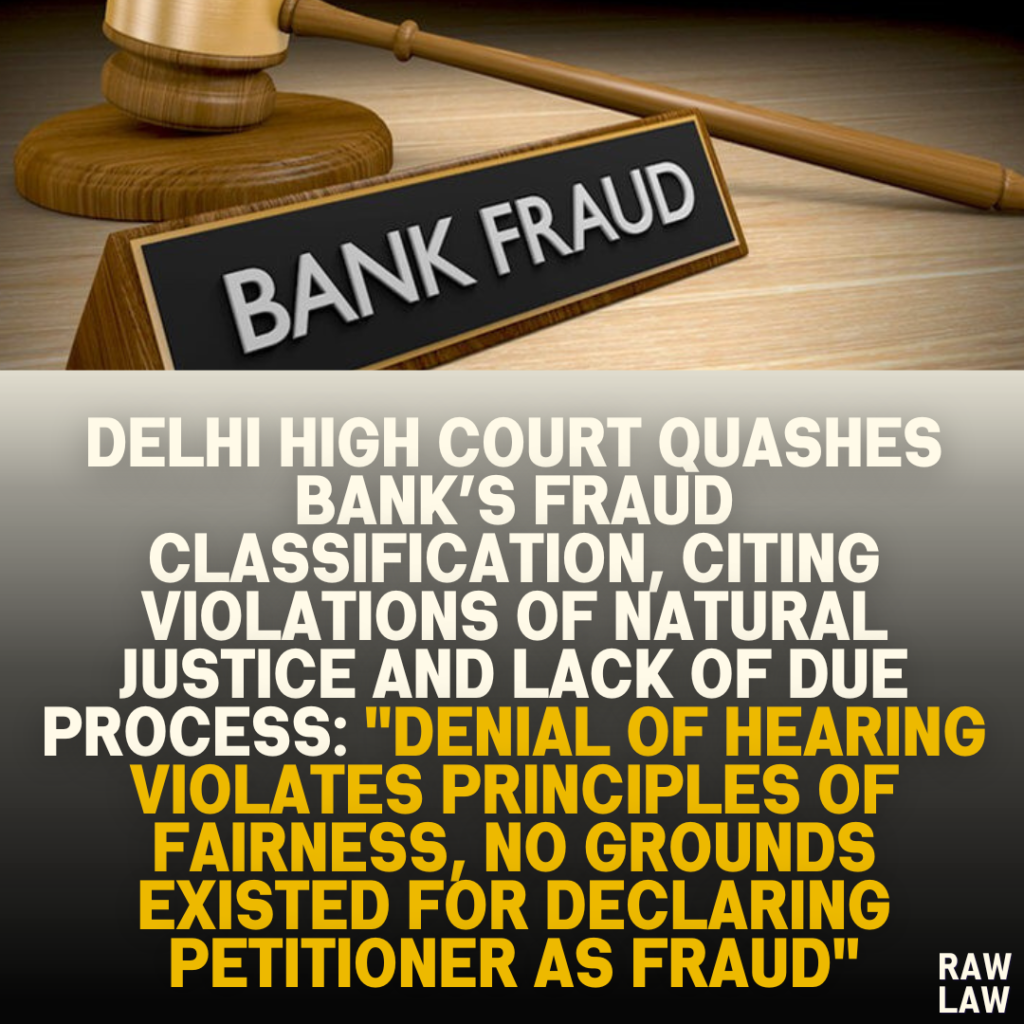Court’s Decision:
The Delhi High Court allowed the writ petition, quashing the bank’s classification of the petitioner as “fraud.” The court directed the respondent bank to remove the petitioner’s name from the Central Fraud Registry within 15 days, stating that “no grounds ever existed” to justify such a designation due to non-payment of loans.
Facts:
The petitioner, a former executive of Moser Baer Solar Limited (MBSL), resigned in 2012 following operational disputes. Despite this, the petitioner’s account was later categorized as “fraud” in the Central Fraud Registry based on alleged mismanagement in MBSL, including fund misappropriations and business setbacks experienced after his departure. The bank’s classification followed forensic audits revealing questionable financial practices at MBSL, including the use of funds for unrelated group entities.
Issues:
- Whether the petitioner’s classification as “fraud” adhered to the principles of natural justice.
- Whether the bank was justified in classifying the petitioner as a “fraud” based on actions taken post-resignation.
Petitioner’s Arguments:
The petitioner argued that the classification was arbitrary, citing his resignation years prior to the events in question. He contended that the bank had neither provided him a show-cause notice nor any documentation of the forensic audit that led to the fraud designation. He further argued that the decision contravened natural justice principles.
Respondent’s Arguments:
The bank, represented by its Chief Manager, argued that the classification was grounded in forensic findings that exposed significant fund misappropriations within MBSL. According to the bank, MBSL’s diversion of funds and other financial irregularities warranted the “fraud” designation, irrespective of the petitioner’s resignation date.
Analysis of the Law:
The court referenced the RBI’s “Master Directions on Frauds” and highlighted how such classifications involve severe civil consequences, necessitating strict adherence to natural justice principles. The court analyzed precedent from Rajesh Aggarwal, where the Supreme Court held that classifying an account as “fraud” without a hearing violates natural justice and the borrower’s rights under Article 19(1)(g).
Precedent Analysis:
The court cited the Rajesh Aggarwal case, affirming that fraud designations must involve procedural fairness, including notice and an opportunity for the borrower to respond. The Supreme Court had emphasized that these classifications severely impact a borrower’s reputation and financial standing, thus warranting due process.
Court’s Reasoning:
The court found the respondent bank’s actions deficient, noting the absence of any documented evidence that the petitioner had been notified or allowed to contest the “fraud” classification. By denying the petitioner a hearing, the bank failed to uphold the standards established in Rajesh Aggarwal and violated fundamental principles of fairness.
Conclusion:
The court ruled in favor of the petitioner, quashing the fraud classification and mandating its removal from the registry. It reiterated that procedural safeguards are essential when imposing a designation that can effectively end a borrower’s access to institutional finance.
Implications:
This ruling reinforces the necessity for banks to follow due process when classifying accounts as fraud. It serves as a precedent, emphasizing that borrowers must receive notice and an opportunity to respond to serious allegations affecting their creditworthiness.



